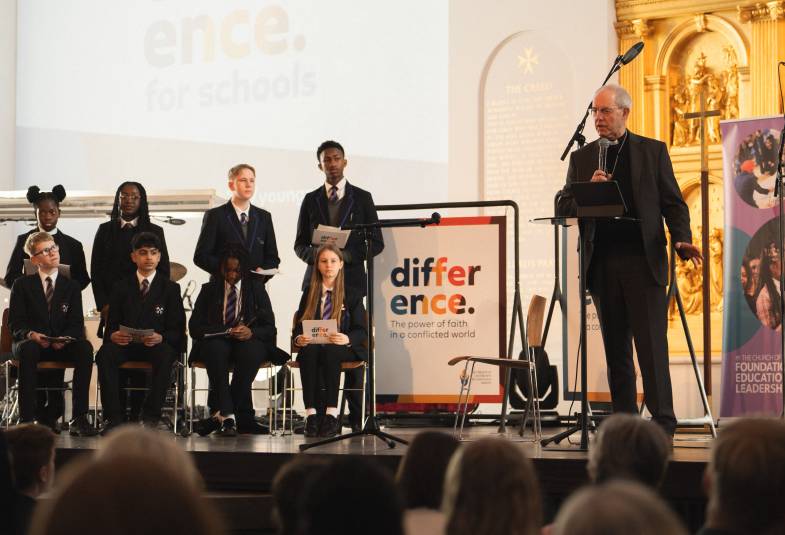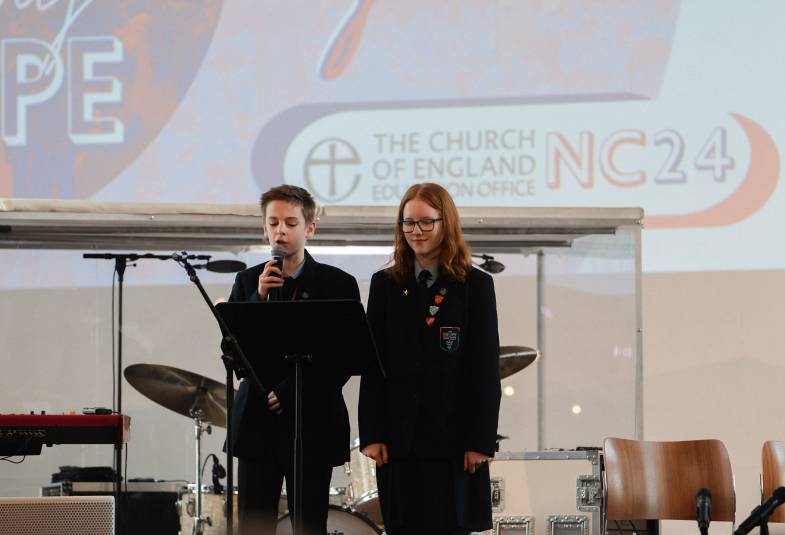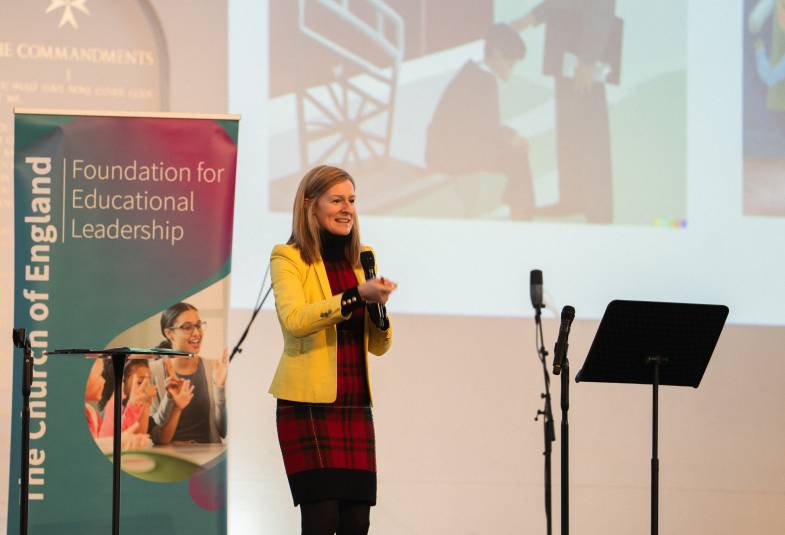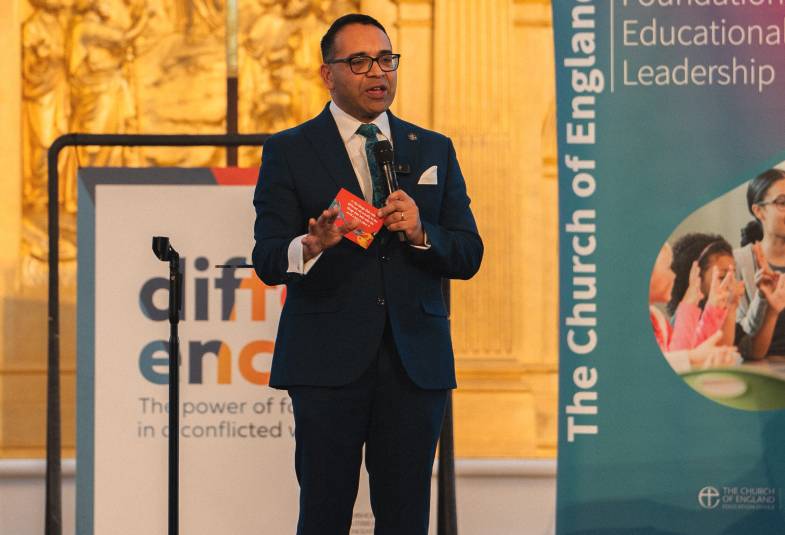05/02/2024

The Archbishop of Canterbury addressed the Church of England’s 6th National Education Conference, including the launch of two new initiatives for schools.
The Church of England’s sixth National Education Conference saw more than 600 delegates gather at Hackney Church, including students, headteachers, faith leaders, diocesan education leaders and more.

The Conference was led by students from the Archway Learning Trust in the Diocese of Southwell & Nottingham, who hosted the event, led prayers and provided music in the form of a worship band. Leaders were from the Bluecoat Wollaton Academy, Bluecoat Aspley Academy, and The Nottingham Emmanuel School.
Keynote speakers, along with the Archbishop of Canterbury, were Dr Krish Kandiah, and Laura McInerney, founder of Teacher Tapp.

Students from St Peter’s Wolverhampton and St Peter’s Stoke had the chance to question Archbishop Justin on why he had made a priority of reconciliation, and what advice he would give to people struggling to forgive friends and family.
Responding, he said he had observed a society where people were losing the ability to disagree without hating each other.
“If you follow that path on you end in catastrophe,” he said.
“I grew up in a family that was bitterly divided with real problems. That gave me a deep sense that one of the best things we can do as Christians is not only to introduce people to Jesus but to enable people to deal with disagreement well.
The students from St Peter’s Wolverhampton and St Peter’s Stoke had been among those who were involved in piloting the Difference course and were asked by Archbishop Justin if they felt other schools should run the course.
Responding one student replied “Yes, I think people should take the difference course because it allows them to open up with more confidence by using the three habits be present, be curious and be imagine.
“As it went on, I opened up more. And just felt more confident.”

Continuing with his keynote speech, Archbishop Justin explained why the Difference for Schools course had been developed.
“Our society is complex, ever more intertwined owing to social media and is struggling to grapple with differences and division in such a way that all can truly flourish.
“Social media has connected us in ways we never imagined possible, but it also works to drive us ever further apart.
“We know at the moment what it is to be trolled to be threatened. It happens in school communities. It happens in local communities, happens at a national and a global level.”
“We can become so immersed in echo chambers where we hear our own views affirmed, that other perspectives begin to feel frightening.
Quoting UN Secretary General Antonio Guterres, he said:
“’Our world is becoming unhinged. Geopolitical tensions are rising. Global challenges are mounting, and we seem incapable of coming together to respond.’
“In this context, the question of how society shapes those who are growing up, who are teenagers and children. How we educate could not be more urgent and more essential, more fundamental to our whole future.”
“Difference a free six-session resource equipping students to cross divides, - to disagree well, and to grow flourishing school communities.”

Laura McInerney, a former teacher and journalist who co-founded ‘Teacher Tapp’, a daily polling app used by more than 10,000 teachers, shared data showing how teachers had reported work-related anxiety on the platform during the Covid-19 pandemic, with peaks coming at the times of the announcements of lockdowns, reopening and key Government announcements affecting schools.
She said that the pandemic had highlighted the importance of school life to their whole communities, and that: “flourishing adults know that from their greatest challenges comes the greatest growth, and learn this from organisations that recognise the adults in their teams as their most precious resource.”
She illustrated sources of hope in the example of George Tomlinson, Secretary of State for Education in the post-World War II period, who had invested in the rebuilding of schools, amid a recovering economy.

Dr Krish Kandiah, a writer and broadcaster and founder of The Sanctuary Foundation, said that one of the most transformative relationships is the partnership between parents and schools. He added that teachers had not received the recognition they deserved during the Covid-19 pandemic and were part of the heroic response in the pandemic alongside Doctors and Nurses.
He then went on to explain why it was more important than ever for children and young people to be faith literate.
“There are 5.8 billion religiously affiliated adults and children around the globe. If we don’t recognise the contribution faith makes to our world, we aren’t equipping children to live in the world as it is,” he said.
He said that Church of England schools helped foster an environment which was “faith-positive not faith-prohibitive” and “faith curious not faith furious”
“Rather than getting furious with people who have different views on faith, let’s be curious – let’s open the conversation.”

The Bishop of Durham, Paul Butler, bade farewell as he retires at the end of February, having been the Church of England’s lead bishop for Education. He said that the number one highlight of his ministry had been seeing the Church of England put Children and Young People at the Centre of its Vision. He will be succeeded as lead Bishop by the Bishop of Portsmouth, Jonathan Frost.
Teachers who attended the conference commented that the day had filled them "with the hope and belief that we can come together to create a brighter future for our children"
Difference for Schools is a student development programme which equips young people to build good relationships with themselves, their peers, and the world around them. It has been developed in partnership by The Archbishop of Canterbury’s Reconciliation Team at Lambeth Palace and the Church of England Education Office. Last year it was piloted in ten schools across the country.
FLOURISH is a network of new worshipping communities in schools. Not simply using the building, but through shared leadership between church, school, and especially young people, to create an active community of faith.